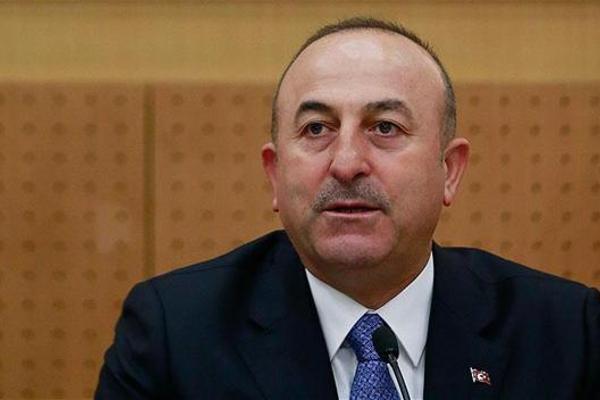Netherlands cancels flight permit for Turkish FM, Turkey summons diplomat
ISTANBUL


Turkish Foreign Minister Mevlüt Çavuşoğlu is seen in this file photo. / AA Photo
The Netherlands has canceled a flight clearance for Turkish Foreign Minister Mevlüt Çavuşoğlu on March 11, which caused reaction from Turkey, after Çavuşoğlu said hours earlier that Turkey would impose “severe sanctions” against the Dutch state.Çavuşoğlu was scheduled to fly to the Netherlands’ Rotterdam on March 11, but the flight clearance for his airplane to land in the country was canceled just hours before his flight on grounds of "security" and "public safety," Dutch Foreign Ministry announced in a statement on March 11, according to state-run Anadolu Agency.
The Netherlands’ charge d’affaires to Ankara was summoned to the Foreign Ministry on March 11, state-run Anadolu Agency said.
After his rallies were canceled in the Netherlands, Çavuşoğlu was set to hold a meeting at the Turkish consulate in Rotterdam late on March 11. In a statement, the Justice and Development Party (AKP) Rotterdam election coordination center that the event was canceled after the Netherlands' halt to Çavuşoğlu's flight permit.
Dutch Prime Minister Mark Rutte said that while the Netherlands and Turkey could search for "an acceptable solution,” Turkey was not respecting the rules relating to public gatherings.
"Many Dutch people with a Turkish background are authorized to vote in the referendum over the Turkish constitution. The Dutch government does not have any protest against gatherings in our country to inform them about it," he said on Facebook, according to Reuters.
"But these gatherings may not contribute to tensions in our society and everyone who wants to hold a gathering is obliged to follow instructions of those in authority so that public order and safety can be guaranteed," Rutte added.
Earlier in the day, Çavuşoğlu said in a live interview on CNNTürk that if the Netherlands cancels permit for his flight to the country later in the day, Turkey would impose sanctions.
“Now there is the Netherlands. Dutch [nationalist politician Geert] Wilders acts like a Nazi. He threatens the foreign minister of the Turkish Republic with not letting the airplane take off. But I will go today,” said Çavuşoğlu.
“If the Netherlands cancels my flight clearance today then we will impose severe sanctions,” he said, adding that he would fly to the Netherlands later in the day.
Turkey’s “sanctions threat had made search for reasonable solution impossible," the Dutch statement read, according to Reuters.
Turkey to start implementations toward Netherlands after April 16: Erdoğan
Following the cancellation of Çavuşoğlu’s flight permit, Turkish President Recep Tayyip Erdoğan said March 11 Turkey would start its implementations after the April 16 referendum.
“[Addressing the Netherlands] Do as much pressure as you will, support terrorists as much as you will. All of these will return to you in a negative way. We will start our implementations against these after April 16,” said Erdoğan at a public address during an opening in Istanbul’s Bağcılar district.
“We are patient,” he said.
“How will your airplanes land in Turkey from now on?” asked Erdoğan, adding that he was talking about diplomatic airplanes to land in the country and not about the normal travel of people.
“They are remnants of Nazi. There are fascists, you would now this like it is,” Erdoğan said.
On March 5, an infuriated Erdoğan described the cancelations of meetings in Germany as “fascist actions” reminiscent of the Nazi era, invited a strong rebuke from Germany.
German Chancellor Angela Merkel said March 9 that Ankara’s references to the Nazi period over the cancelation of Turkish ministers’ meetings in the country must stop.
"These comparisons of Germany with Nazism must stop. They are unworthy of the close ties between Germany and Turkey and of our peoples," the center-right chancellor told the Bundestag lower house of parliament.
Opposition defends right to impose sanctions
Turkey’s EU minister and its chief negotiator with the bloc, Ömer Çelik, said on March 11 that the reasons the European authorities stated to cancel Turkish ministers’ meeting “had racist, fascist, anti-democratic, anti-human rights, Islamophobic and anti-Semitic approaches” in their backgrounds.
Turkey’s main opposition Republican People’s Party (CHP) Kemal Kılıçdaroğlu said that it was Turkey’s right to impose sanctions on the Netherlands over the latest developments.
Relations between Germany, Austria and the Netherlands on the one hand and Turkey on the other soured over Turkey’s planned “meeting with citizens” campaign events ahead of the April 16 referendum, during which a package of constitutional amendments will be voted upon.
Germany, Austria and the Netherlands have canceled such scheduled events to be attended by Turkish ministers in their own countries usually on grounds of security reasons. A large amount of Turkish citizens or people with Turkish heritage live in these countries and Turkish citizens living abroad have the right to vote in elections and referenda.
On March 9, Dutch Prime Minister Mark Rutte said that they do not want Çavuşoğlu to hold rallies.
“This is the most serious thing we can do, to tell the foreign affairs minister of a NATO ally: ‘We know you will come to the Netherlands: Don’t come,’” he said.
Rutte added that the local authorities would be unlikely to authorize any rally Çavuşoğlu would attend.
“And if you still decide to come, you won’t have a chauffeur driven car, no escort, no support,” he said, adding that while “there are people who will say, ‘you have to arrest him at Schiphol,’ we will stop just short of that.”
